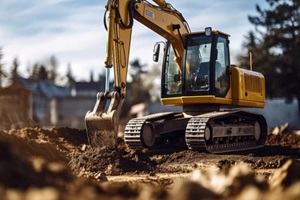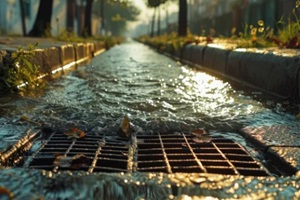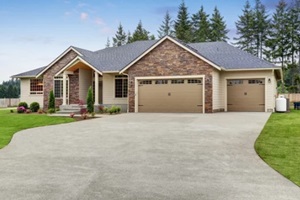 When you’re knee-deep in a construction or landscaping project, getting the lay of the land just right can make the rest of the project so much easier. It’s all about setting the stage for solid drainage, a firm foundation, and that wow factor in the final landscape. But let’s face it, land grading isn’t always a walk in the park.
When you’re knee-deep in a construction or landscaping project, getting the lay of the land just right can make the rest of the project so much easier. It’s all about setting the stage for solid drainage, a firm foundation, and that wow factor in the final landscape. But let’s face it, land grading isn’t always a walk in the park.
Today, we’re going to take a closer look at some helpful strategies for overcoming the more common challenges you may face. We’re talking about wrestling with challenging terrain, keeping water runoff in check, and making sure the ground cooperates with all your land grading project plans.
The Differences in Terrain and Soil Types
The first step in effective land grading is understanding the terrain you’re working with. Different soil types, from sandy to clay, behave differently under pressure and moisture. For instance, sandy soil drains quickly but lacks stability, while clay is stable but prone to waterlogging.
Conduct a thorough soil analysis before starting your project, which involves testing for soil composition, density, and moisture content. Understanding these traits is necessary for selecting the appropriate equipment and grading methods.
For example, heavier machinery might be needed for compact soils, whereas lighter equipment could suffice for looser soil types.
Common Land Grading Challenges in Projects Today
Navigating the complexities of land grading involves addressing a spectrum of challenges, ranging from soil composition to water management.
This section will prepare you for some common obstacles and offer practical strategies for overcoming them to help ensure successful and sustainable land grading outcomes.
Managing Slopes and Erosion Control
Slope management is an important part of land grading, as a poorly managed slope can lead to erosion, water runoff problems, and structural instability. The key is to create a slope that’s steep enough for effective drainage but not so steep that it causes erosion or is difficult to landscape, which often involves creating terraces or retaining walls in steeper areas.
On top of this, employing erosion control measures — such as geotextiles, erosion control blankets, or planting vegetation — can stabilize the soil. These methods not only help prevent soil erosion but also play a significant role in enhancing the project’s sustainability.
Water Runoff and Drainage Challenges
Controlling water runoff is a significant challenge in land grading. Inadequate drainage can result in water accumulation, potentially compromising the stability of structures and causing foundational problems.
 In order to address this, it’s important to integrate drainage strategies into your grading plan, which could involve the installation of French drains and culverts or altering the landscape to channel water away from buildings.
In order to address this, it’s important to integrate drainage strategies into your grading plan, which could involve the installation of French drains and culverts or altering the landscape to channel water away from buildings.
In addition, consider the impact of your project on the surrounding landscape. It’s important to ensure that your grading work doesn’t cause drainage problems for neighboring properties.
Potential Environmental Considerations
Modern land grading projects should implement environmentally responsible methods. This includes being mindful of natural habitats, watercourses, and the overall ecological impact of the work. Make sure to adhere to local environmental laws carefully and strive to reduce the environmental impact of your project.
Techniques such as phasing the work to reduce disruption, using silt fences to protect waterways from sediment, and preserving existing vegetation where possible can help maintain ecological balance.
Furthermore, consider the long-term impact of the grading work, such as how it might affect soil health and local biodiversity in the future.
Potential Financial and Time Constraints
Land grading can be a significant investment, and budget constraints might limit the extent of the project. With this in mind, it’s important to strike a balance between the requirement for adequate leveling and the resources at your disposal.
Time constraints, especially related to agricultural schedules, can also be challenging. Effective project management and realistic scheduling can help mitigate these issues.
Lack of Expertise and Skilled Labor
The success of land grading significantly depends on the expertise and skills of the operators, and a lack of experienced personnel can lead to subpar results. Hiring skilled professionals and providing necessary training can ensure high-quality outcomes.
Overcoming Land Grading Challenges with Technology
Leveraging technology can significantly streamline the grading process and eliminate many common challenges the projects may face. Modern tools, including GPS-guided equipment and drones, help provide greater precision in grading to ensure that slopes and elevations are accurate to the plan.
Software applications can help model the terrain and simulate different grading strategies before any physical work begins, saving time and reducing the risk of costly mistakes.
Furthermore, innovative technology such as laser scanning can provide real-time feedback on the grading progress, allowing for immediate adjustments as needed.
Additional Grading Considerations
Key aspects of successful grading include managing drainage issues (especially in sloped landscapes), ensuring ample dirt and soil quality, locating and respecting utility lines, and avoiding grading at higher elevations initially.
It’s also important to pile dirt at low points, pay attention to curved beds in landscaping, and ensure proper soil compaction and slope adjustment.
Grading for Different Structures and Property Value
 When it comes to grading for different structures, a tailored approach is the key to a successful project. Each structure, whether it’s buildings, decks, driveways, patios, pools, or landscaping areas, demands a unique grading method designed to accommodate them.
When it comes to grading for different structures, a tailored approach is the key to a successful project. Each structure, whether it’s buildings, decks, driveways, patios, pools, or landscaping areas, demands a unique grading method designed to accommodate them.
Specialized techniques are also required for constructing retaining walls and buffer zones. Importantly, proper grading not only serves functional purposes but can also considerably enhance property value, particularly when integrated seamlessly into overall landscaping and property improvement plans.
Trust the Northern Virginia Land Grading Experts
From understanding the intricacies of soil types and terrain to mastering the art of slope management and water drainage, successful land grading requires a blend of science, technology, and environmental stewardship.
The challenges are many, but with the right approach, equipment, and expertise, they can be overcome, paving the way for sturdy foundations, efficient water management, and breathtaking landscapes.
Whether you’re embarking on a residential or commercial project, the importance of professional expertise in land grading cannot be overstated — and this is where Dirt Connections can help.
Equipped with a team of seasoned experts and cutting-edge machinery, they’re fully prepared to address all your grading needs across Virginia and Maryland.
For those in Virginia, reach out at 1-(703)-940-9949, or if you’re in Maryland, dial 1-(301)-691-3215. You can also visit them online to learn more about their residential and commercial land grading services and discover how they can simplify your project.
Summary

Dirt Connections was started with one goal in mind: providing quality residential and commercial construction services to clients on time and on budget. Reach out for more information on how we can support your next project.
For your convenience our estimates are free and by appointment. Call 703-940-9949 for a free estimate today!









































